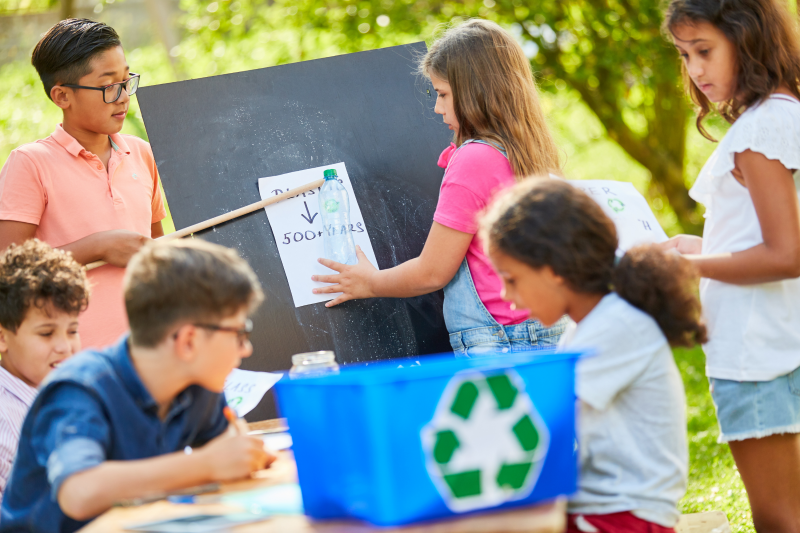4 May 2021 | Education and employment
How to keep children active and learning after lockdown

Justine Goode, Year 4 teacher and PE lead, suggests how schools can build movement into learning to restore children’s mental and physical well-being after lockdown.
The cold, dark weeks of the latest lockdown made it hard for families to get their children moving, and many pupils have returned to school with their activity levels at an all-time low. This enforced inactivity has had a huge impact on children’s mental and physical well-being at a time when looking after the health of the nation has never been so important.
Barriers to Learning
Exercise is not only good for the body, it is good for the mind, and if children don’t get the opportunity for physical activity, it can affect their ability to learn.
Worryingly, a slowdown in activity is more pronounced for pupils from disadvantaged backgrounds who are already battling against a widening attainment gap. Research from Sport England reveals that, during the first lockdown, 13% of children from less affluent backgrounds did no exercise, compared with 6% from more affluent homes.
It’s yet another example of the pandemic deepening existing inequalities.
So how can schools make up for the weeks of inactivity and build as much movement as possible into the school day?
An Active Recovery
Most children have missed out on weeks of face-to-face teacher time, so schools need to identify gaps and address them quickly. But this can be done without sacrificing time spent on physical activity.
When pupils returned after the first lockdown, I noticed that some of my Year 4 children weren’t as confident as they could be in their understanding of shapes. So we used a lively game where pupils connected up the points of pentagons and hexagons to help them embed this knowledge.
Some children may need extra help improving key skills such as multiplication. Physical activity helps to embed facts in the memory and make a task fun, so we encouraged children to learn their times tables by counting up in sixes or sevens while jumping over toys in the classroom.
The Great Outdoors
School life will be affected by Covid restrictions for some time yet, and getting children out into the fresh air as much as possible is the safest way to learn.
To boost pupils’ progress outside the classroom, we set maths trails around the school playground. The children followed the trails in groups, carrying out calculations together and running off to find cards with the correct answers.
There is no need for elaborate PE equipment to keep children moving and learning. Simple props can help children understand new concepts too. One popular lesson involved hunting for sticks and stones on the school field to create a clock face, which children used to learn how to tell the time.
The pandemic has taken its toll on children’s fitness, but combining lessons with physical activity is the quickest way to get children healthier, happier and ready to learn.
About the author
Justine Goode is a Year 4 teacher and PE lead from Beaudesert Lower School.
Teach Active is a collection of almost 3000 English and maths lesson plans and resources for teachers from foundation stage through to year 6 that are closely mapped to the national curriculum. Any teacher can access these free active lesson plans for schools in English and Maths from Teach Active.
Enhancing Children and Young People’s Mental Health
During the Coronavirus Pandemic, children and adolescents have been subject to a major adjustment to online learning, missed social interactions, and, in some cases, bereavement and significant stress in the family environment due to job losses and financial struggles.
The Enhancing Children and Young People’s Mental Health event takes place online, 3rd November 2021.
Join us as we address the complex set of issues behind the increasing demand for mental health services for children and young people.
The event brings together senior industry leaders from across the children services industry, health services, Government, academia, and the wider public sector to hear from some of the UK’s leading experts on preventative care, management strategies, and treatment.
Learn more about the Enhancing Children and Young People’s Mental Health Event.
Events

The National Operating Theatres Show 2026
10 March 2026

The Annual Facilities Management in the Public Sector Show 2026
17 March 2026

The Future of Academies Show and Exhibition 2026
25 March 2026

The Annual Special Educational Needs and Disabilities (SEND) Conference 2026
25 March 2026

AI in Healthcare Conference 2026
1 April 2026
Courses

Women In Leadership
6 March 2026
-4 spaces available

Construction Leadership and Management Development Programme - CMI Level 5
10 March 2026
3 spaces available

Effective Leadership Through Emotional Intelligence - CMI Level 7 Award
17 March 2026
4 spaces available

Leaders in Construction Programme - CMI Level 7
24 March 2026
6 spaces available

Mastering Change Management Programme – CMI Level 7 Award
7 April 2026
5 spaces available